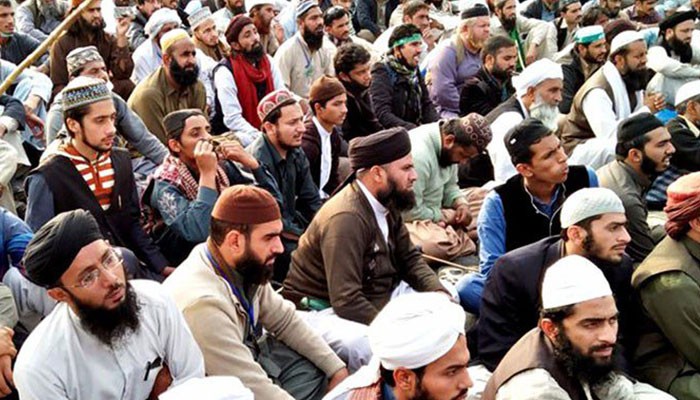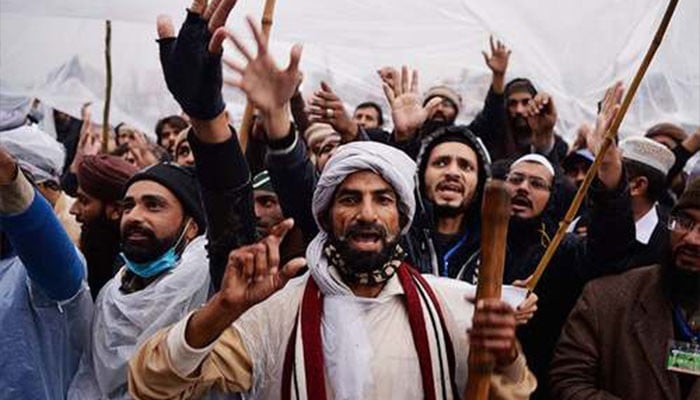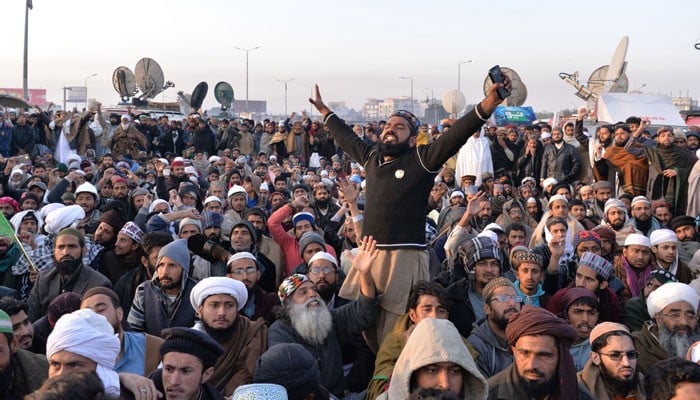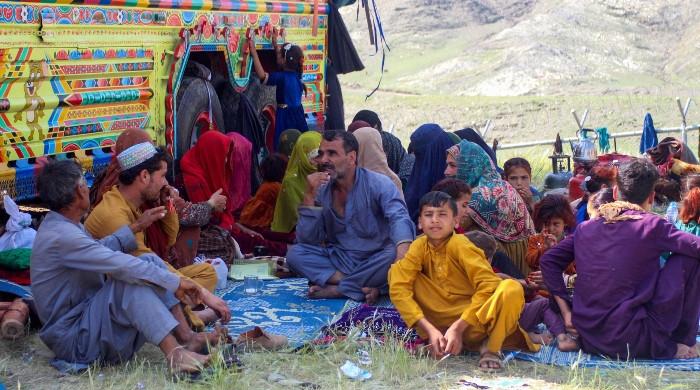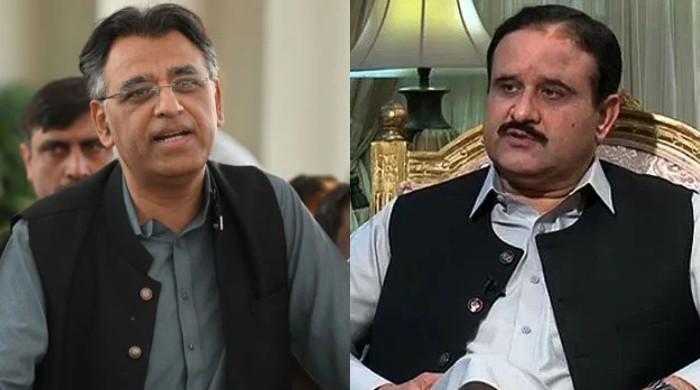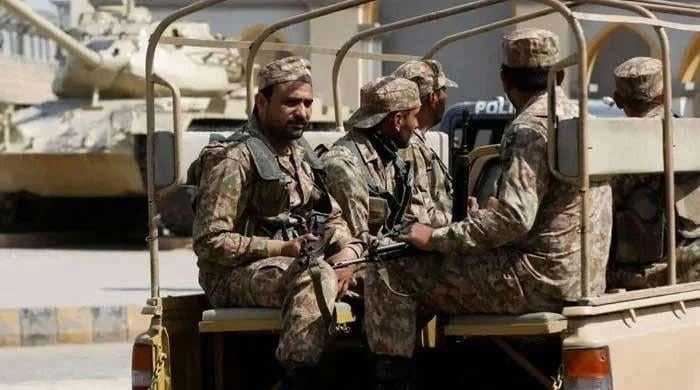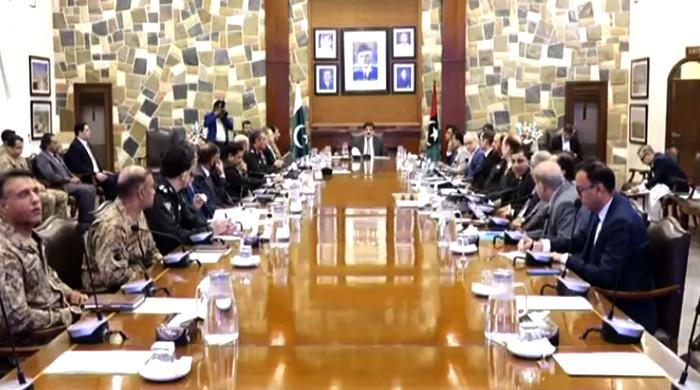Steps on to remove Labbaik leaders from Fourth Schedule
Sources said names of 30 Tehreek-e-Labbaik leaders, including Khadim Rizvi and Asif Jalali, were in the Fourth Schedule
December 05, 2017
LAHORE: The Punjab Home Department has started preparing a list of Tehreek-e-Labaik leaders for removing their names from the Fourth Schedule — a police watchlist.
The department has decided that all these leaders would be kept under surveillance, but police are not going to interfere in their affairs, contrary to other persons on the Fourth Schedule.
According to sources, the names of 30 Tehreek-e-Labbaik leaders, including chiefs of the two factions, Khadim Rizvi and Asif Jalali, were included in the Fourth Schedule.
A meeting would be held between the party leaders and senior officials of the Home Department in the next two days to settle all the issues, the sources added.
An official notification has also been issued on the orders of the Punjab Home Department for releasing the 1,500 Tehreek-e-Labbaik workers and leaders, who were arrested during the Islamabad sit-in.
The government’s inability to implement the protocols merited by the Fourth Schedule has cost dearly, as this laxity shown for the proscribed persons could lead to another disaster.
Rizvi, after making life of inhabitants and rulers difficult in the federal capital, has recently announced a Lahore-Islamabad march next month on the heels of the Faizabad disaster.
Also, Jalali with less than 200 people, blocked the busiest and most significant thoroughfare of the provincial metropolis for over a week. Both of these individuals are listed under the Fourth Schedule.
The Fourth Schedule
In addition to these two, other religious leaders and people from different sectarian groups included in the 4th Schedule are: Pir Afzal Qadri (Alami Tanzeem Ahle Sunnat), Pir Ashraf Jalali (Tehreek Labbaik Pakistan), Aurangzeb Farooqi (ASWJ), Allama Naseer Raza Safdar (Sahiwal), Qari Sakhawat Ali (Sialkot), Sabir Alvi (Gujranwala) and Allama Sajid Farooqi.
While those already listed under this law appear completely immune to it, more are added every day. According to the data available with sources in the National Counter Terrorism Authority (NACTA), the four provincial home departments have placed at least 8,633 individuals under the Fourth Schedule untill October 10, 2017 for various reasons, The News has learnt.
Around 1,500 people belong to different sectarian groups have been included in the list. Out of these, around 350 are Shia.
The Fourth Schedule is a list of proscribed individuals who are suspected of terrorism and/or sectarianism under Anti-Terrorism Act (ATA), 1997. After credible intelligence information, their names are included in the list as prescribed by the Home Department and can be subjected to restrictions on travel, speech and conducting business.
Names of proscribed persons are also referred to in local police and law enforcement agencies as Fourth Schedulers. The name of any individual carrying a history of affiliation with a proscribed organisation may be recommended for the Fourth Schedule. It is pertinent to mention here that the name of a person is usually placed on the Fourth Schedule for three years but the duration can be extended.
During this period, the Interior Ministry seizes their bank accounts and cancels their CNICs/passports. Moreover, fourth schedulers are not allowed to leave their hometown without the permission of the local SHO.
But interestingly, those listed under the Fourth Schedule can contest elections. Masroor Ahmad Jhangvi’s name was included in the list in 2014 but he took part in the by-election from Jhang in 2016, which he won. Jhangvi is the son of firebrand leader Haq Nawaz Jhangvi, who formed the defunct militant sectarian outfit Sipah-e-Sahaba.
'Lack of will, not capacity'
The government, therefore, had the ability to monitor and know the intentions of Jalali before he staged the sit-in. It is not that they do not have the capacity or legal cover to prevent such disasters, they lack the will and the courage, said South Asia Partnership Pakistan (SAP-PK) Executive Director Muhammad Tahseen.
It is not as if Rizvi sneaked into Islamabad without his intentions being unknown. He held a press conference to announce exactly what he is going to do. But the government did not stop him.
“There is nothing wrong or lacking in the law of proscribed persons under the Fourth Schedule, if the government apparatus implements it in its true spirit,” said former interior secretary Tasneem Noorani.
Mullah Fazlullah was an ordinary cleric when he was placed on the Fourth Schedule, but, unfortunately, the protocols of the schedule were never practiced by governments at that stage and later he became a monster, he added.
Both Noorani and Tahseen were of the view that the Islamabad and Lahore sit-ins could have been avoided, had the protocols merited by the Fourth Schedule been implemented in letter and spirit.
On the other hand, a CTD spokesperson said adequate measures, including physical and technical surveillance, were in place to monitor Fourth Schedulers.
DIG Operations Amir Zulfiqar explained that the Fourth Schedulers were bound to submit surety bonds with the relevant police stations. He said if any of them created a law and order situation, they can be booked under the Anti Terrorism Act, 1997.
Additionally, Fourth Schedulers have to inform the police station before leaving and returning to their homes, he added.
The Punjab government spokesman Malik Muhammad Ahmed Khan was asked as to how these persons managed to move freely, despite being Fourth Schedulers, with a clear intent to disrupt order.
“The government is continuously looking into that matter from provincial to the district level,” he replied.
“The Home Department and the relevant deputy commissioner, on the basis of intelligence reports, decide whether anyone should be expunged or placed on the Fourth Schedule. The Punjab government is strictly following the parameters set in the National Action Plan and no anti-state element will be allowed to work freely or mock the law,” the spokesman added.
Originally published in The News
